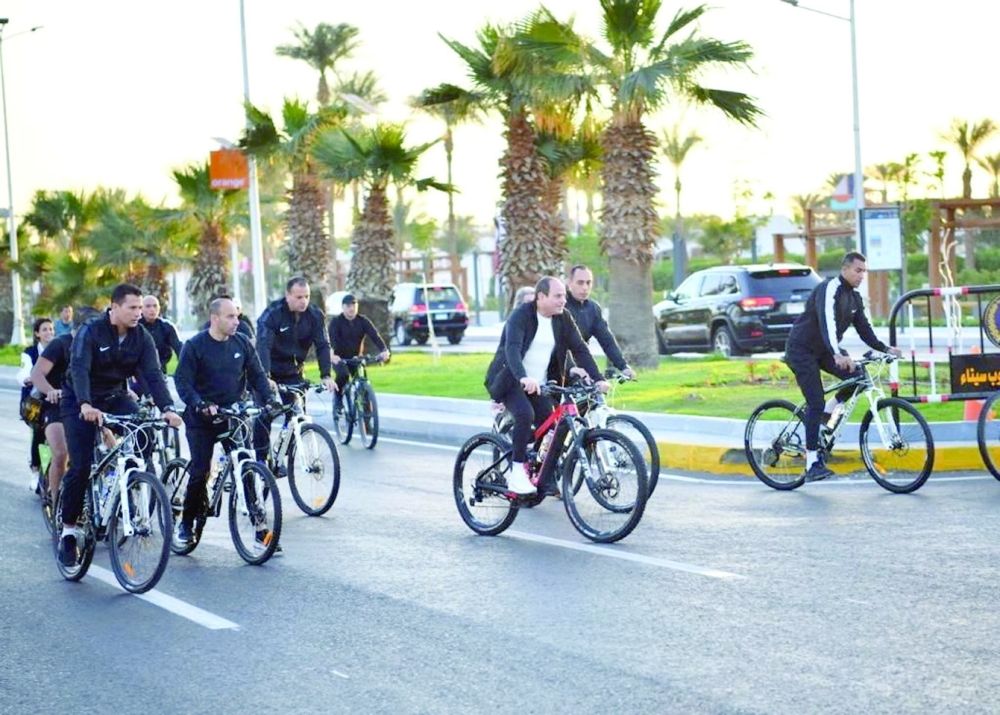

SHARM EL SHEIKH: Decades of development progress are at risk as economies are pushed backward by climate change losses, the Covid-19 economic fallout, a growing cost-of-living crisis, and soaring debt and inflation, the UN development chief said at COP27 in Egypt.
"We essentially document a regression - and regression that is virtually universal across the board," said Achim Steiner, who leads the United Nations Development Programme (UNDP).
Progress towards the globally agreed Sustainable Development Goals - which include ending poverty and hunger and are due to be achieved by 2030 - is sliding, he said, with some countries finding themselves back where they were in 2016.
The economic pain is making it harder for many governments to find the funding needed to roll out clean energy and tackle climate change - something that would have been easier when interest rates were still low, Steiner said in an interview.
With 54 countries now in debt distress - and getting close to defaulting - "it will be more costly to step in," he added.
But multiplying global crises, particularly the war in Ukraine, are also creating new incentives to swap fossil fuels for renewable energy, with its possibilities for cheaper power bills once in place and greater energy independence, he said.
It has also become clearer that demands for environmental protection and economic advancement are "no longer forces pulling in opposite directions", especially as renewables like solar become the cheapest source of energy, Steiner said.
That means there are still strong possibilities to wrest the world off using coal, oil and gas and onto a greener development path, despite the economic headwinds around the globe, he said.
The problem - particularly for poorer, debt-ridden countries - is finding the money to actually install clean energy, which has higher upfront costs but produces decades of cheap power.
DROWNING IN DEBT
One solution to boost renewable energy faster - and reap the development benefits that come with it - may be debt forgiveness, Steiner said.
"For many countries this is an absolutely horrendous moment," he said. "They can't go to the financial markets."
Debt forgiveness - or debt-for-climate swaps, in which money freed up from cancelled debt goes directly into climate projects - would be like "putting a scalpel to a festering wound", painful but necessary, he added.
A momentum-gathering push at COP27 to reshape international financial institutions to make it easier for money to flow where it is needed also is part of the puzzle, he said.
"Our financial system... needs to evolve with the size and nature of the challenges," Steiner said. "We need better institutions."
Barbados Prime Minister Mia Mottley has proposed a revamp of post-World War II international financial systems, dubbed the "Bridgetown Agenda", designed to boost climate funding flows and make them easier to access for debt-strapped countries.
The proposal has won some early key backing, including from France's President Emmanuel Macron.
Sameh Shoukry, Egypt's COP27 president, has also called for new finance that is "sustainable and cheap".
"Undoubtedly this is an important gap in climate action," he said.
ADAPTATION AND RISK
Besides powering up green energy investment, more money is needed to help countries adapt to climate change impacts that are already happening, and to reduce the risks, so as to stop development efforts sliding, Steiner said.
The US "Adaptation Gap" report, released this month, says developing countries may need as much as $340 billion a year by 2030 to stay ahead of wilder weather and rising sea levels.
Finding much-needed private investment for adaptation efforts is difficult, because the returns are less clear and often seen as having only local impact, it noted.
But Steiner, whose agency is trying to create a pipeline of adaptation projects to attract investment, said the shortfall in finance has far wider implications than many people realise.
Flood-battered Pakistan, for instance, is likely to see its exports of key commodities like cotton and rice hit, which affects international markets and commodity prices. Making payments on its debt will also be tougher with less income.
"When nations such as Pakistan undergo the kind of profound shock they've just gone through, when small island nations in the Caribbean every year worry about in 12 hours losing a third or more of their GDP... you have created an economically impossible scenario," Steiner said.
That has direct implications for rich countries and the global economy - not just those nations being slammed the hardest, he said.
"The wealth of many of the savers in many of the wealthy countries are inexplicably linked to the economies of the Global South," he added.
Success at the COP27 negotiations in Sharm el Sheikh, he said, will require leaving the talks with a sense that climate action is pushing forward "built on shared interests, transparency, mutual accountability and trust".
"This is not a law-making convention," he noted. "This is essentially negotiating an extraordinary transition in our economies, with 8 billion people sitting at the table." -- Reuters
Oman Observer is now on the WhatsApp channel. Click here


